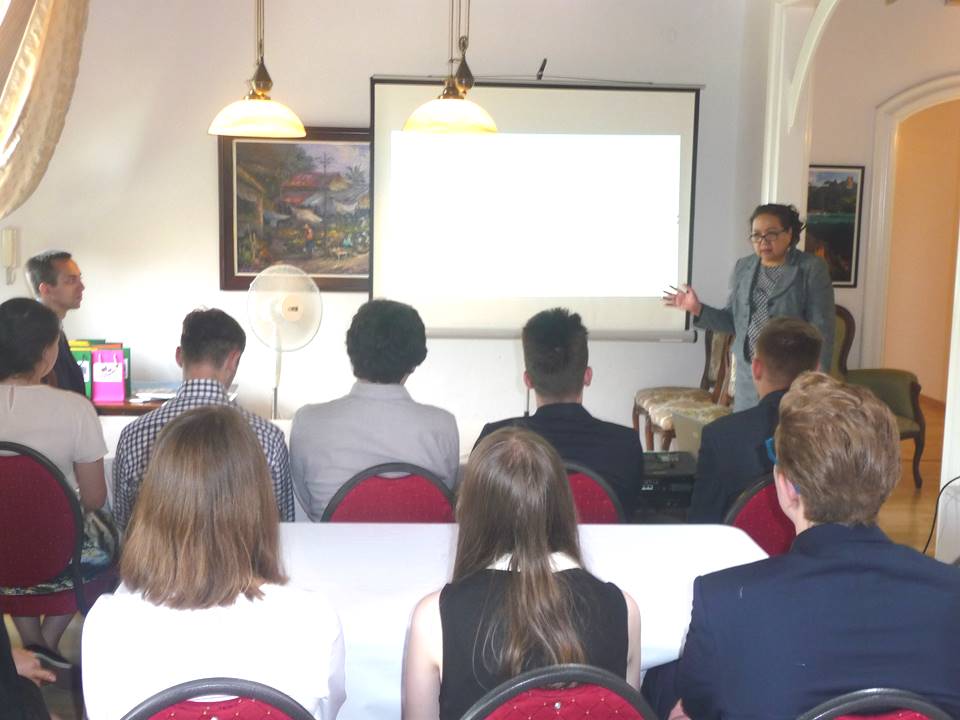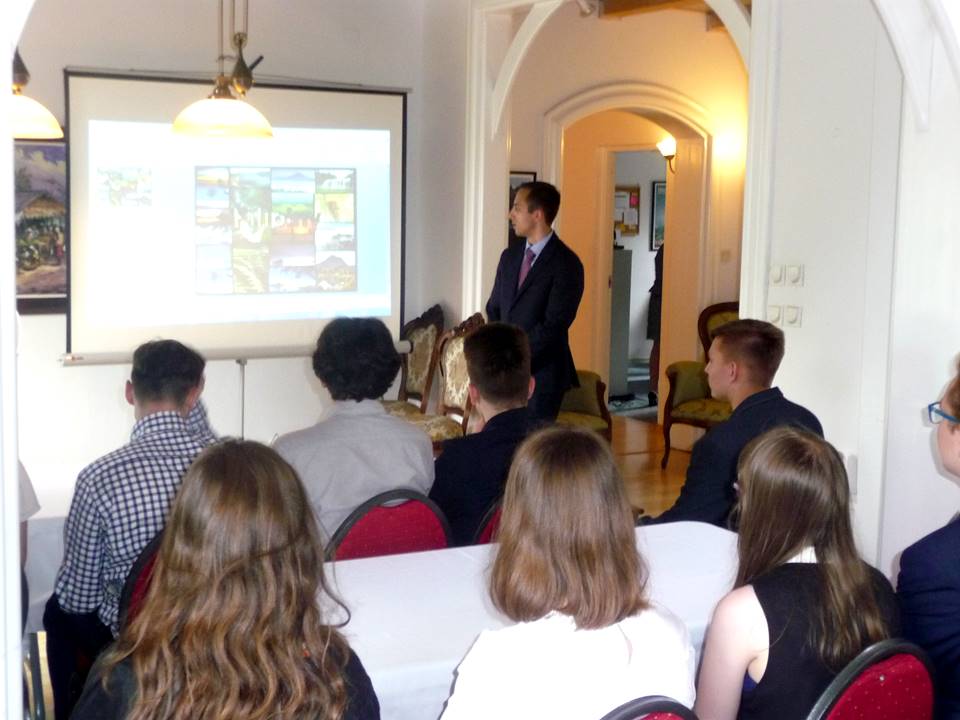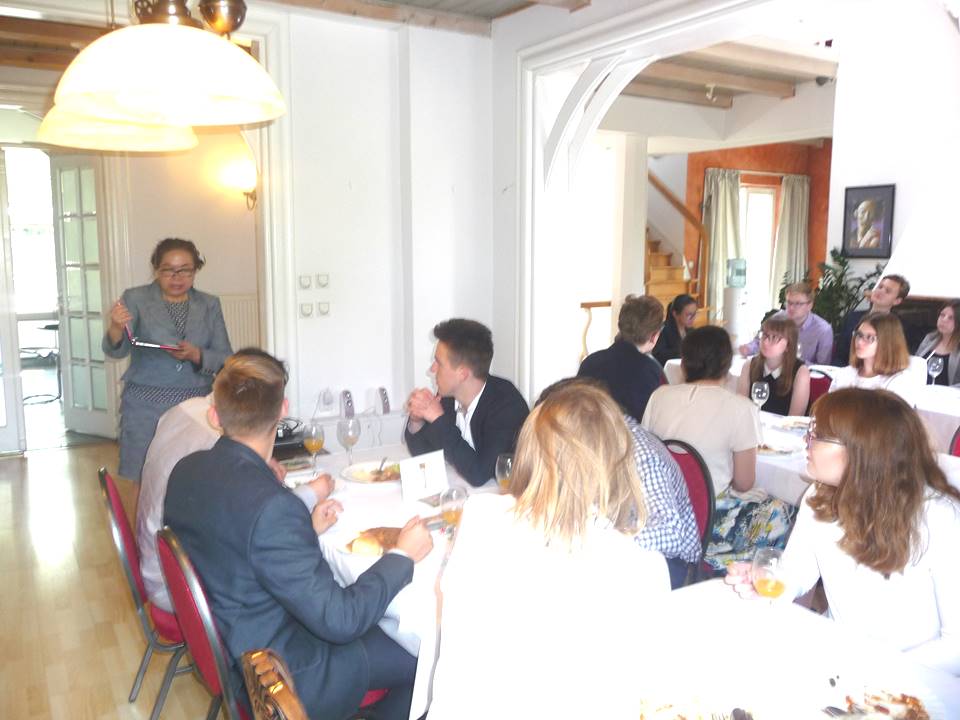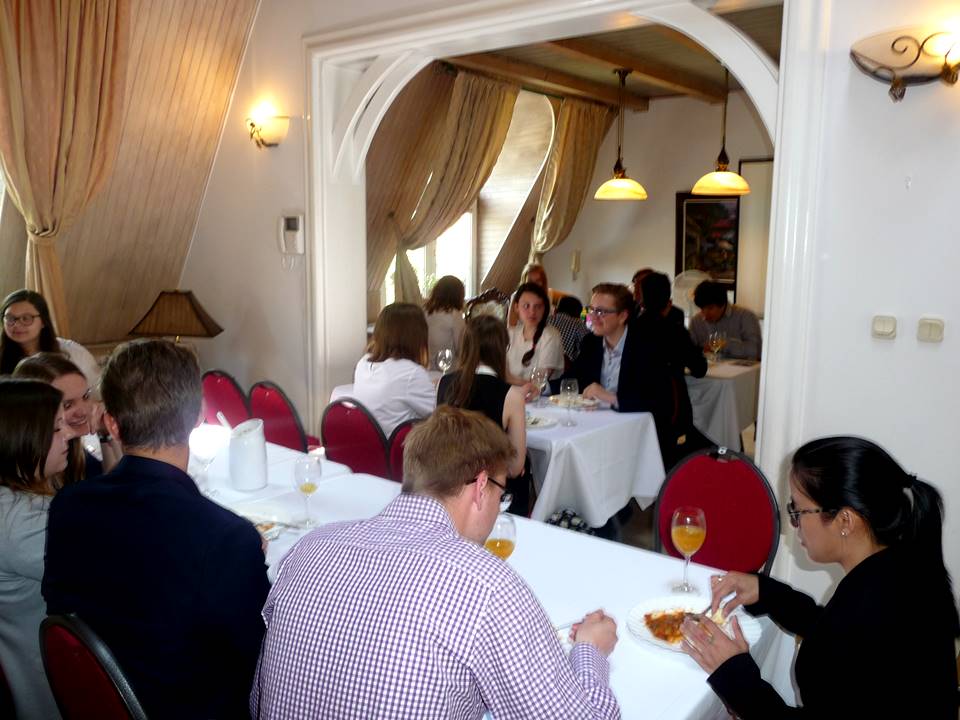Philippine envoy to Poland talks about the Philippines‘ continuing war on drugs and on the declaration of martial law in Mindanao to students of Jan Sobieski; also in photo (extreme left) is Assistant to the Ambassador for Economic and Cultural Diplomacy Mr. Oskar Groblewski
Assistant to the Ambassador for Economic and Cultural Diplomacy Mr. Oskar Groblewski presenting an overview of the Philippines and the accomplishments of the Duterte administration
Amb. Paez shares a video clip of President Duterte’s speech before the Filipino community in Qatar. She said that the video clip is one of the many proofs of the overseas Filipinos’ respect and adulation for the Philippine president. She added that an overwhelmingly majority of Filipinos support President Duterte’s war on drugs and the declaration of martial law in Mindanao to eliminate the ISIS-linked terrorists.
To complete their “orientation” about the Philippines, the students were served a modest lunch of pan de sal, menudo, fresh “lumpia,” and mango juice. Seated (extreme right) is Ms. Imelda de Joya who assisted in the preparations for the event.
WARSAW__Philippine ambassador to Poland Ms. Patricia Ann V. Paez discussed the Philippines’ continuing war on drugs and the declaration of martial law in Mindanao during the recent visit of the students of diplomacy from the Jan Sobieski to the Philippine Embassy in Warsaw.
She emphasized to them that the present Philippine government adheres to the rule of law and does not condone alleged extra judicial killings (EJKs) in its war against drugs.
Regarding the declaration of martial law in Mindanao, which is the southern 1/3 of the Philippines, Amb. Paez said that this was imperative to decisively quash the rebellion in Marawi City instigated by the ISIS-linked “Maute” group and Isnilon Hapilon of the terrorist Abu Sayyaf Group (ASG). Hapilon has been designated as “emir” in Southeast Asia by the ISIS. Hapilon’s objective is to carve out a territory in southern Philippines and establish a “caliphate” of the ISIS in Southeast Asia.
The Maute Group led by the Maute brothers, namely Omarkhayam and Abdullah, is also behind the illegal drug trade in Marawi City which helps “fuel” or finance the terrorists’ activities.
Martial law has been imposed for a period of 60 days. It has to be Mindanao-wide in its scope to prevent the terrorists’ onslaught from spilling over to the provinces and cities adjoining Marawi City, to constrict the terrorists’ areas of operations and maneuver; to seal off the possible entry points for their reinforcements as well as possible escape routes; and to cut off the terrorists’ supply lines.
Concerning the war on drugs, Amb. Paez explained that the initial exaggerated figure of 7,000 alleged total number of EJK victims was touted by an online foreign-funded Manila-based news outfit and this number was repeated over and over again by some international media and human rights organizations, although it was not vetted and fact-checked. As President Duterte himself observed, these news sources could not even provide the names of the alleged victims and the circumstances of their deaths, i.e. date, time, location of the incident, etc. It turned out, she said, that this figure represents the total number of reported homicides in the country, most of which are not drug-related.
Amb. Paez said that if, indeed, the Philippine government has been resorting to the expedient of killing drug users and pushers as a matter of State policy, how can one explain the fact that there are now over 1.2 million drug surrenderees who are alive and who are being rehabilitated; in stark contrast to the much lower but exaggerated 7,000 figure of alleged victims of EJKs.
Amb. Paez also explained that President Rodrigo Duterte’s clear instruction to police authorities has been to arrest and detain drug addicts and pushers; but when they resist arrest and violently fight back, thus, putting at risk the lives of the arresting policemen, the latter can shoot them in self-defense. She said that this is within the ambit of lawful rules of engagement not only in the Philippines but as practiced by law enforcers the world over.
She noted that the killings perpetrated by the so-called “riding in tandem” (in motorcycles) have been happening even before the Duterte administration assumed office and are still undergoing investigation. There are possibilities that such killings are being done by drug syndicates to eliminate potential “whistleblowers;” by “vigilantes,” and by rogue cops and local officials who are involved in the illegal drug trade.
This billion dollar drug trade has already infested around 47% of the country’s 42,036 barangays or villages and has resulted to an estimated 4.7 million drug addicts.
Cognizant of the involvement of some police officials in the illegal drug trade, President Duterte has ordered the Philippine National Police (PNP) to cleanse its ranks. The mission of waging the war on drugs has been transferred from the PNP to the Philippine Drug Enforcement Agency (PDEA).
Amb. Paez also informed the students that due to the relentless war against drugs, the country’s crime rate has gone down to 30%; especially since most heinous crimes were and are being committed by drug-crazed perpetrators. Thus, she added, despite the quick and unfair condemnation levelled against the Philippines’ war on drugs, President Duterte’s public approval and trust rating has remained high, ranging from 76% to 85%.
The envoy showed the students a video clip from YouTube of President Duterte’s speaking engagement with the Filipinos working in Qatar as proof of the overseas Filipinos’ enormous respect and adulation for their incumbent president. She urged the students to access video clips from YouTube of President Duterte’s speech before the Filipino communities in Japan, Singapore, Thailand, Saudi Arabia, Bahrain, etc. so that they could see for themselves clear proofs of the rousing welcome which overseas Filipinos accorded to President Duterte.
She explained that such response stems from the fact that Filipinos working overseas are no longer as gravely anxious as before about the safety and security of their children and other family members they have left behind. Now, they are somehow assured that their children will not become victims of drug addicts or become drug dependents themselves. These overseas Filipinos toil in other countries, at times, even enduring abuses and indignities, just so they can send their children to school and provide them with a better future.
In a related development, the PDEA reported the following accomplishments covering the period from 01 July 2016 up to 15 May 2017: 57,892 anti-drug operations conducted; 73,125 drug personalities arrested; 14.52 billion pesos worth of dangerous drugs seized; 8 clandestine shabu laboratories dismantled; 139 drug dens dismantled; 43 marijuana eradication operations conducted; 112 marijuana plantation sites destroyed resulting in the destruction of 4.96 billion pesos worth of illegal hemp; and the filing of 35, 274 airtight drug cases.
Following President Duterte’s “marching orders to stop the drug problem within the bounds of the law,” PDEA Director General Mr. Isidro Lapena said that PDEA has been implementing a “balanced and integrated approaches of supply and demand reduction strategies under the Barangay Drug Clearing Program.” He also said that the creation of the Inter Agency Committee on Anti-Illegal Drugs or ICAD “has unified, integrated, and synchronized all anti-drug efforts and strategies to holistically address the drug problem.” (END)





